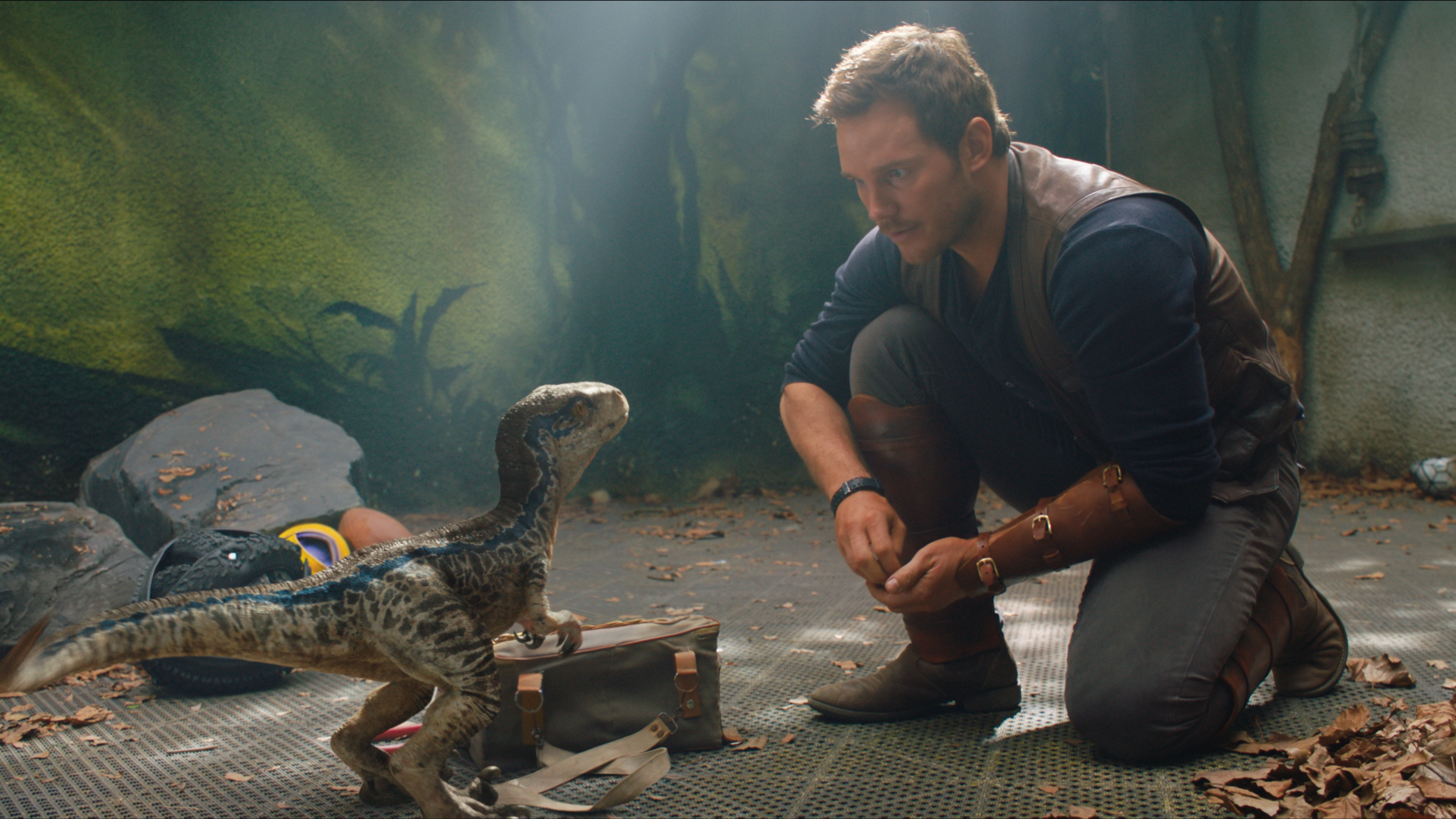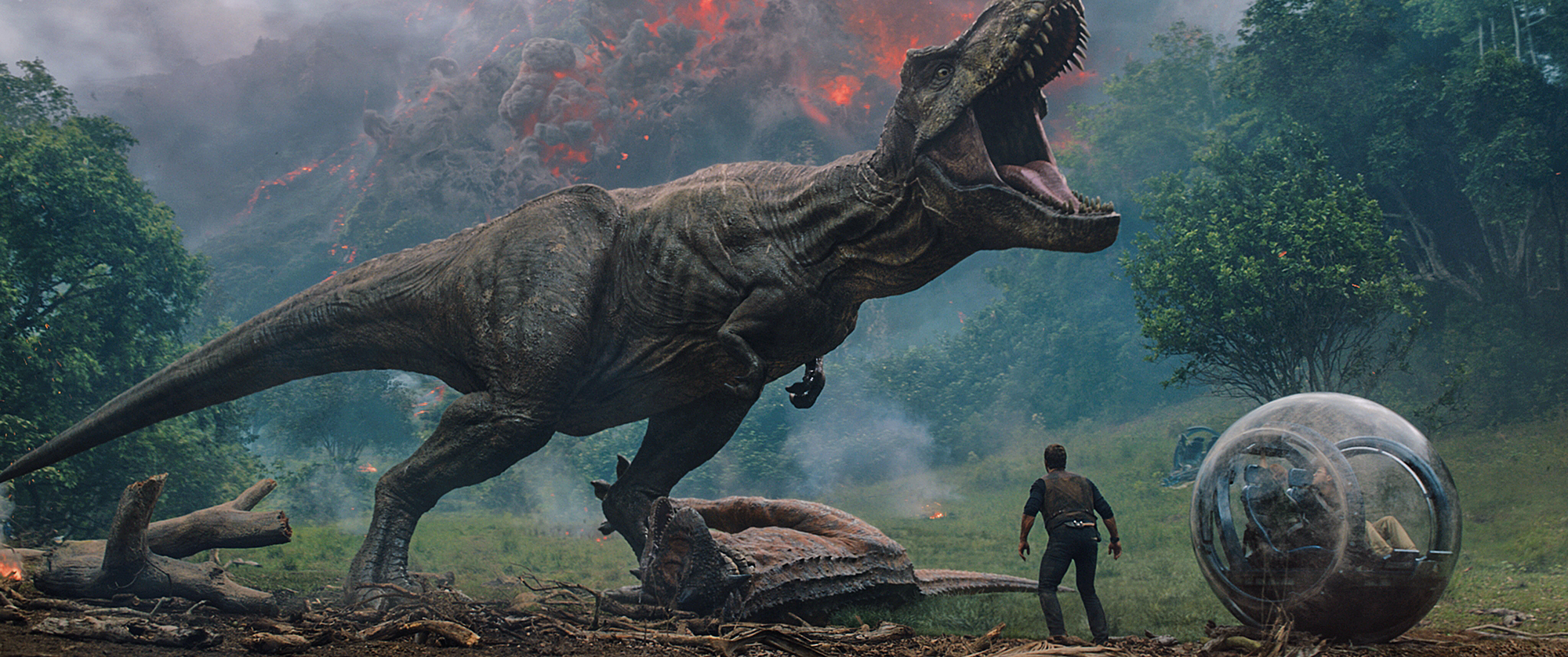
Owen Grady (Chris Pratt) returns as the raptor-whisperer amidst more dinosaur troubles in JURASSIC WORLD: FALLEN KINGDOM
Jurassic World: Fallen Kingdom opens up a few years after the events of its predecessor. After the horrific events that happened at the park, it has been abandoned, but still monitored. When volcanic activity threatens to wipe out the remaining dinosaurs, former Jurassic World employees Owen (Chris Pratt) and Claire (Bryce Dallas Howard) return for a rescue and extraction mission, at the behest of a private corporation. To the surprise of only the characters on screen, a plot to capture the dinosaurs and use them for nefarious purposes is the real intention of the mission.
What works in Jurassic World: Fallen Kingdom are the thrills and female supporting cast. Taking a slight queue from the tonal quality established in the original 1993 film, director J.A. Bayona’s playbook consists of keeping the audience on edge and scaring them with misdirects whenever possible. Bayona is largely successful in this regard. The director appears to acknowledge that this franchise has morphed from intelligent science fiction to something more akin to old fashioned monster movies. Jurassic World: Fallen Kingdom exists to entertain audiences with a few shrieks and screams by making logic-devoid humans make logic-devoid decisions. If one can accept this straw-person premise, the film becomes very easy to enjoy.

One of the larger complaints surrounding Jurassic World centered on its use of female characters. Howard’s Claire in particular infamously made odd choices regarding park safety and attempted to out-run a tyrannosaurus rex in high heels. Bayona appears to have heard this criticism because the primary trio of woman in Fallen Kingdom are all among the smartest and most capable in the film. Howard no longer shows any signs of being the damsel in distress, and often leads others out of peril with calm poise. Zia (Daniella Pineda) is a former Marine turned paleo-veterinarian with gumption, who challenges barking men with a bored yawn—”you really want to draw that velociraptor’s blood? Go right ahead; I won’t stop you, but I won’t do it either.”
And finally, no Jurassic movie would be complete without a child in dinosaur danger, and this time the duty falls to Maisie (Isabella Sermon). Maisie, unlike her cinematic predecessors, is incredibly savvy and clever, making reasonable decisions about how to stay safe. Having these wise individuals at the center of the story helps enhance the terror as the audience accepts the fact they are actually doing the best they can to survive,— an issue that has cropped up in this franchise previously.

While Jurassic World: Fallen Kingdom is bolstered by well-designed suspense and smart protagonists, it does crumble a little bit under the weight of the human antagonists who are both unnecessarily evil and unbelievably stupid. The premise that humans shouldn’t genetically meddle with nature, or attempt to control it, is a theme that has run in the lifeblood of the series since Jurassic Park and was fairly prominent in the first Jurassic World, with people attempting to create hybrid dinosaurs. Fallen Kingdom basically repeats these obvious bad decisions almost beat for beat, which is redundant and makes the decision-makers look like ignorant fools.
At some point it becomes too easy for audience to categorize every person on-screen as good or bad which then telegraphs their fate—heroes survive through some incredible luck or superhuman feat, and with villains it becomes merely a question of which dinosaur will gobble them up and when. If the Jurassic franchise truly wants to move more into the horror genre, it should remember that uncertainty regarding characters’ survival helps raise intensity, which help raise heart rates.
Jurassic World: Fallen Kingdom is surprisingly entertaining, and may actually be the most fun and scary entry in the series in a long time, assuming watchers can turn their brain off a bit.
Grade: B+
Photos courtesy of Universal Pictures